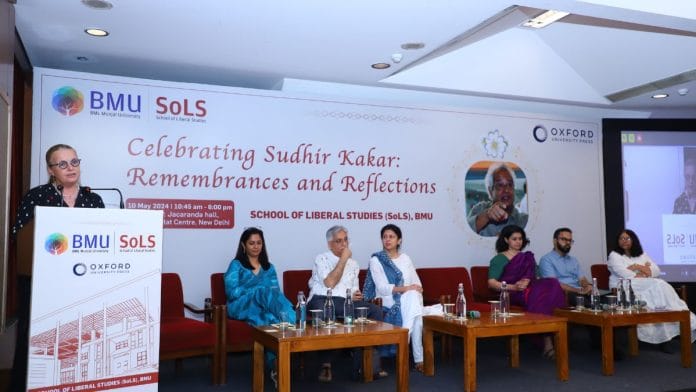New Delhi: Psychoanalyst Sudhir Kakar died merely two weeks before he was due to attend the launch of his book. But the event didn’t get cancelled. In fact, the School of Liberal Arts of BML Munjal University showed how to give a fitting tribute to the father of Indian psychoanalysis. They held a day-long event called ‘Celebrating Sudhir Kakar: Remembrances and Reflections’ on 10 May.
A homage in spirit where his friends and colleagues shared memories and anecdotes, the event was also an academic exercise with paper presentations and exchange of ideas. Kakar had published pioneering research on sexuality in the Indian psyche, was critical of puritanical attitudes to sex, and explored the relationship between psychoanalysis and mysticism—all within the context of a post-independent India.
“After two years of friendship with Kakar, I can say with confidence that he was not just a bridge-maker but also a path-finder,” said Ramin Jahanbegloo, vice dean and executive director, Mahatma Gandhi Centre for Peace Studies at OP Jindal Global University.
“I think Kakar would have liked to be remembered as what the 18th-century philosophers called an animator of ideas,” he added.
It was an emotional and intellectual farewell to India’s foremost psychoanalyst whom the French magazine Le Nouvel Observateur had once described as one of the 25 major thinkers of the world.
The event at India Habitat Centre’s Jacaranda Hall was packed with students, prominent psychologists, editors, and intellectuals. People from different corners of the world and time zones also joined in virtually.
The programme was scheduled into four sessions, culminating with the launch of his four-volume series, The Mind in the World: Selected Writings by Sudhir Kakar.
“This exercise in remembering Sudhir not only brings to the forefront who he was as a thinker and scholar but also who he was as a person. Hopefully, it will inspire many to build the Center for Psychoanalysis and Culture he dreamed of to establish India’s and other cultures’ contributions in psychoanalysis and culture and beyond,” said Katharina Poggendorf-Kakar, scholar and wife of Sudhir Kakar.
An Indian way of dreaming
Kakar straddled dreams and drama, India and the West, culture and science with ease. Through his work, he explored the role of culture in psychoanalysis and studied inclusivity and universal consciousness.
“I know only one other Indian who can be called inter-cultural, and that was Rabindranath Tagore. Kakar was open to the West and East in a very Tagorean way,” said Jahanbegloo. In fact, he even wrote a psychobiography called Young Tagore: The Makings of a Genius (2014) where he reconstructs his childhood and the experiences that shaped him.
His book, The Inner World: A Psychoanalytic Study of Childhood and Society in India, has never been out of print since its first publication in 1978. His last book, The Indian Jungle, is due to come out later this month.
“By placing Indianness and Europeanness on equal footing, Kakar authorised the presence of an Indian form of dreaming, which included the idea that Indian analysts can dream their own rather than simply follow European psychoanalysis,” said Amrita Narayanan, clinical psychologist and psychoanalyst and visiting professor at Ashoka University. She called it renegade, in defiance of the traditional borders in the field of psychoanalysis that is still primarily defined by European and North American practitioners
But Kakar also penned six works of fiction such as The Crimson Throne (2010), set in the time of Shah Jahan, and The Seeker (2015) on an English woman who wants to become Gandhi’s disciple.
“Kakar felt he was not generating new ideas in psychoanalysis anymore, and he wanted to try something else. He started to write fiction after that,” said Harish Trivedi, professor of English at Delhi University.
Also read: Girindrasekhar Bose—India’s first psychoanalyst was pen pals with Sigmund Freud
Bridging the gulf
In February 2012, Kakar was conferred the Order of Merit of the Federal Republic of Germany, the country’s highest civilian order. But all Kakar could reply in response was his musing that the West felt compelled to acknowledge a non-Western psychoanalyst.
Kakar burst into the Indian limelight in the 1990s with a rich offering of writings, books, and columns to TV appearances.
“With extraordinary sympathy, open-mindedness, and insight, Sudhir Kakar has drawn from both his Eastern and Western backgrounds to show how the gulf that divides native healer from Western psychiatrist can be spanned,” wrote Rosemary Dinnage, New York Review of Books on Shamans, Mystics and Doctors.
Intuitive, soft-spoken, and an astute thinker, Kakar was the first choice, along with psychologist and sociologist, Ashis Nandy for interviews on matters of Indian culture and society by foreign journalists.
No one was surprised by the strain of nostalgia and laughter that punctuated the event.
“Kakar was not a fan of mourning,” said Narayanan.
(Edited by Humra Laeeq)






